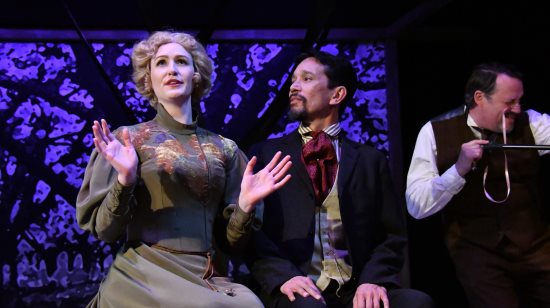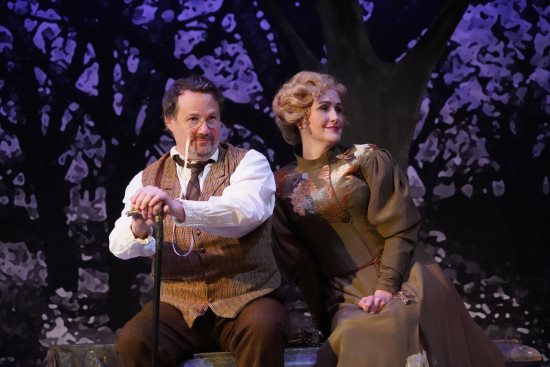 |
|
|
Sarah Ruby, Ted V. Bigornia, and Tim Holt Jones Photos Jay Yamada
|
|
|
|
|
|
It takes great skill to put together the rich tapestry of human characters that are explored in Anton Chekhov's work, in a way that appeals to modern audiences without sacrificing its depth. Town Hall Theatre has successfully met this challenge with "The Cherry Orchard," thanks to a lovely and talented cast led by the precise vision of director Susan Evans.
 The magnificent cherry orchard and the estate it rests on are about to be sold. The most prized possession of an ancient family that used to be powerful in that part of Russia will soon be auctioned to pay for the years of debts that were accumulated through lack of management and carelessness. There are options to get out of the situation, some are very pragmatic and require sacrifices, other are pipe dreams that feel good but are not realistic. This multi-generation drama-comedy, set at the beginning of 20th century is Chekhov's last play. Within the span of two hours it describes the inexorable passage from one world order to another by exploring the everyday life of a few characters. Chekhov's marvelous art is to make us laugh while being touched by human poignancy, and to reach depth and complexity of feelings while depicting simple moments of everyday life.
The magnificent cherry orchard and the estate it rests on are about to be sold. The most prized possession of an ancient family that used to be powerful in that part of Russia will soon be auctioned to pay for the years of debts that were accumulated through lack of management and carelessness. There are options to get out of the situation, some are very pragmatic and require sacrifices, other are pipe dreams that feel good but are not realistic. This multi-generation drama-comedy, set at the beginning of 20th century is Chekhov's last play. Within the span of two hours it describes the inexorable passage from one world order to another by exploring the everyday life of a few characters. Chekhov's marvelous art is to make us laugh while being touched by human poignancy, and to reach depth and complexity of feelings while depicting simple moments of everyday life.
 A changing social order is at the crux of the play. Forty years before the beginning of the play, serfdom was abolished in Russia, but that social hierarchy still impregnates the scene; not only with the old servant who regrets the order where he was a serf and probably had a clear perception of this place in the world, but as one characters explains it, the whole property and the former wealth of the family was built through the labor of this version of slavery. And as the old order has crumbled, modernism is coming in with the train from Moscow now reaching to the countryside, bringing along new opportunities that some will seize.
A changing social order is at the crux of the play. Forty years before the beginning of the play, serfdom was abolished in Russia, but that social hierarchy still impregnates the scene; not only with the old servant who regrets the order where he was a serf and probably had a clear perception of this place in the world, but as one characters explains it, the whole property and the former wealth of the family was built through the labor of this version of slavery. And as the old order has crumbled, modernism is coming in with the train from Moscow now reaching to the countryside, bringing along new opportunities that some will seize.
 The orchard represents the beauty and elegance of a former order that has now lost its pertinence and usefulness. This is one of the most endearing charms of Chekhov's work: the nostalgic lyricism of the atmosphere and the language. The feelings displayed here are caused or not expressed through big action, but by the little details of everyday life: the nostalgia created by a bookcase, the ancient power balance between former slave and master revived by the smell of chicken the now rich former "moujik", the arrival of the tutor of the child who drowned. The central element that makes the quality of Town Hall Theatre's version of the classic play is in the interpretation given by the chosen actors, with emotions that are suggested and internalized, yet perceived by the audience. At the center of the play is Lyubóv Andréïevna Ranévskaya, the mother who lost a child, who is now losing the house where she grew up and can't seem to find in herself the resources to fight; Sarah Ruby is excellent as this central character, bringing elegance, restraint and poignancy to the woman who has been through so much but continues to be generous and loving to a fault.
The orchard represents the beauty and elegance of a former order that has now lost its pertinence and usefulness. This is one of the most endearing charms of Chekhov's work: the nostalgic lyricism of the atmosphere and the language. The feelings displayed here are caused or not expressed through big action, but by the little details of everyday life: the nostalgia created by a bookcase, the ancient power balance between former slave and master revived by the smell of chicken the now rich former "moujik", the arrival of the tutor of the child who drowned. The central element that makes the quality of Town Hall Theatre's version of the classic play is in the interpretation given by the chosen actors, with emotions that are suggested and internalized, yet perceived by the audience. At the center of the play is Lyubóv Andréïevna Ranévskaya, the mother who lost a child, who is now losing the house where she grew up and can't seem to find in herself the resources to fight; Sarah Ruby is excellent as this central character, bringing elegance, restraint and poignancy to the woman who has been through so much but continues to be generous and loving to a fault.
 Each of the other characters embodies one type of reaction in the face of change. Anya (April Deutschle), one of the two daughters is in love with Trofimov, an eternal student who represents the intellectual challenge to the old order. The two young people are full of hope and ready to embrace the future. Trofimov (Jake Gleason) could be a reader of Karl Marx and some of his sententious comments announce the Russian revolution, just over a decade later. Ermolaï Alexéïevitch Lopakhine (Ted Bigornia) exemplifies the former slave who through his ingenuity and hard work has become very rich. He tries to help the family through his advice but is not listened to. He still respects his former masters, but disdain and need for revenge are just below the surface. Varya (Heather Kellogg Baumann) is the adopted daughter who dreams to join a convent or to marry Lapakhin; she is pragmatic but also lost. Boris Borisovich Siméonov-Pichtchik (Mick Renner) is a family friend and also a landowner who is on the brink of financial disaster and dreaming of miraculous rescue. Léonid Andréïevitch Gaiev (Tim Holt Jones) is Lioubov’s brother, even more extravagant and immature than his sister. Firs (Tom Relly) is Gaiev’s frail and aging servant whose decay symbolizes that of the old order.
Each of the other characters embodies one type of reaction in the face of change. Anya (April Deutschle), one of the two daughters is in love with Trofimov, an eternal student who represents the intellectual challenge to the old order. The two young people are full of hope and ready to embrace the future. Trofimov (Jake Gleason) could be a reader of Karl Marx and some of his sententious comments announce the Russian revolution, just over a decade later. Ermolaï Alexéïevitch Lopakhine (Ted Bigornia) exemplifies the former slave who through his ingenuity and hard work has become very rich. He tries to help the family through his advice but is not listened to. He still respects his former masters, but disdain and need for revenge are just below the surface. Varya (Heather Kellogg Baumann) is the adopted daughter who dreams to join a convent or to marry Lapakhin; she is pragmatic but also lost. Boris Borisovich Siméonov-Pichtchik (Mick Renner) is a family friend and also a landowner who is on the brink of financial disaster and dreaming of miraculous rescue. Léonid Andréïevitch Gaiev (Tim Holt Jones) is Lioubov’s brother, even more extravagant and immature than his sister. Firs (Tom Relly) is Gaiev’s frail and aging servant whose decay symbolizes that of the old order.
 Director Evans noted that, as THT artistic director, she chose a newly released version of "The Cherry Orchard" that was unearthed by scholars who found the original text before the first Russian director, Stanislavsky, made cuts in 1904 for its premiere, despite the author's protest. Chekhov called his play a comedy, and this primordial version has more comedic element than that of the one that has universally been played since the first public performance. Chekhov aficionados and first-time viewers alike will enjoy the playful version of one of the most emblematic Russian theatric texts.
Director Evans noted that, as THT artistic director, she chose a newly released version of "The Cherry Orchard" that was unearthed by scholars who found the original text before the first Russian director, Stanislavsky, made cuts in 1904 for its premiere, despite the author's protest. Chekhov called his play a comedy, and this primordial version has more comedic element than that of the one that has universally been played since the first public performance. Chekhov aficionados and first-time viewers alike will enjoy the playful version of one of the most emblematic Russian theatric texts.
 "The Cherry Orchard" will play at Town Hall Theater through March 21. Tickets and special events at https://www.townhalltheatre.com/201920-season
"The Cherry Orchard" will play at Town Hall Theater through March 21. Tickets and special events at https://www.townhalltheatre.com/201920-season
|

